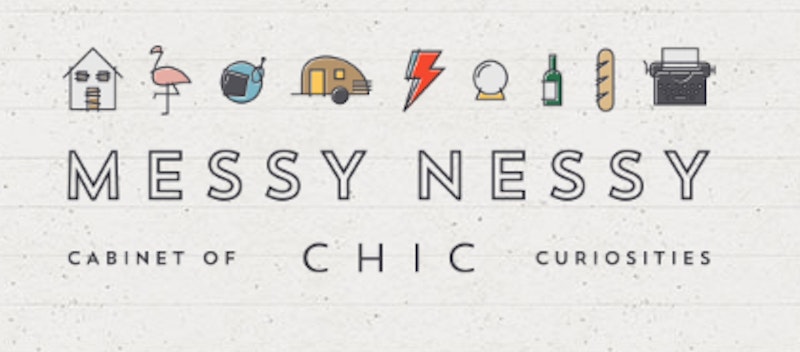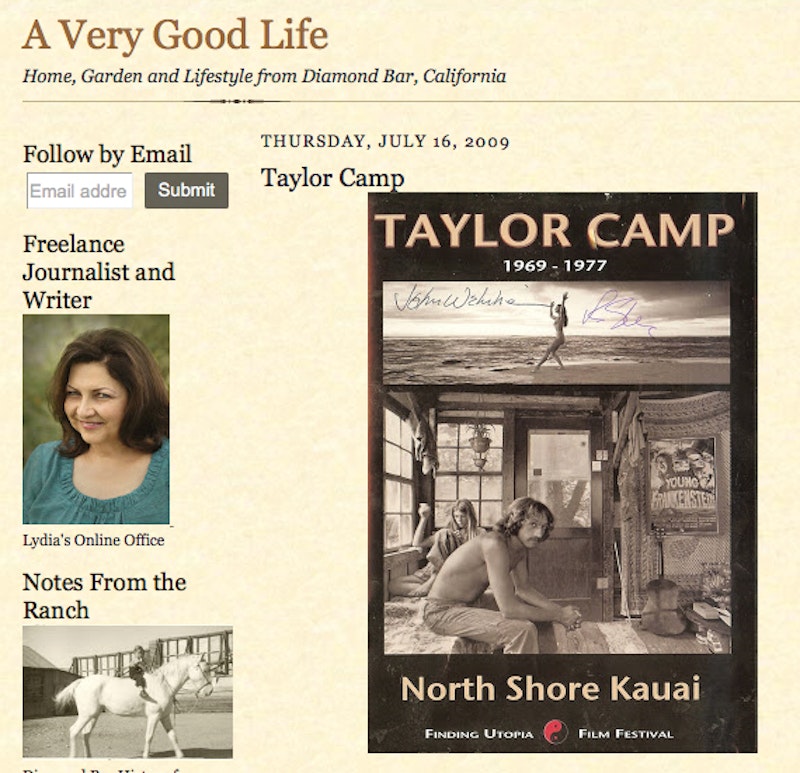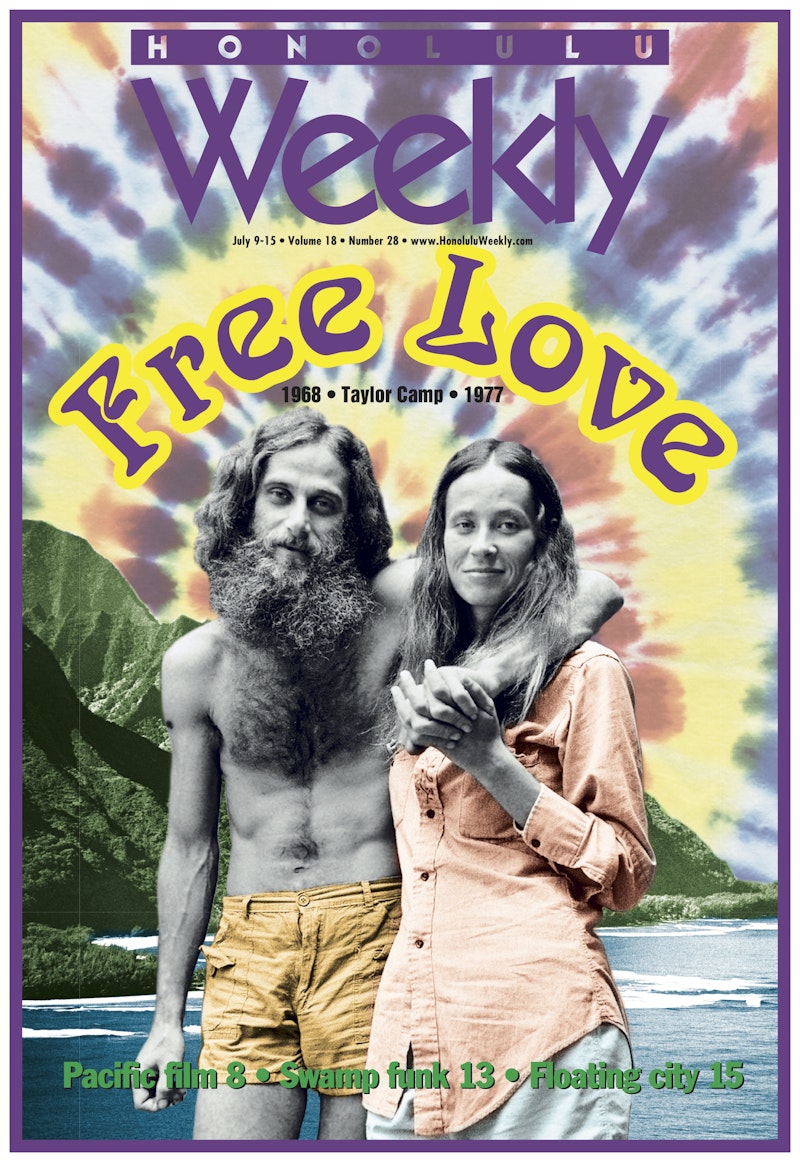Press Reviews
-

Rob Hoffman Oct 4, 2017
Taylor Camp Is The Tropical Ocean-utopia Without Bills, Rules or Politics
"The 1960’s is remembered as a lightning-rod decade for revolutionary change. But when some couldn’t find peace in the larger framework of society, they broke off from the herd to build a better life, with their own rules and ideals..."
READ MORE
-

Rick Chatenever Jul 18, 2017
Maui Connections
"...Converted to HD, Stone’s film is gorgeous. Produced by John Wehrheim, who also shot “Paradise Found’s*” soulful black-and-white still photos, it’s funny, poignant, always fascinating. The ’60s counterculture’s impact on U.S. society is familiar film territory, but this documentary uniquely recalls the movement’s arrival in the fragile ecosystem of paradise, including the inevitable clash with local culture in those early years of statehood.
Taylor Camp lived from 1969 to 1977. An earlier version of the film, which screened at the Maui Arts & Cultural Center, emphasized telling the story of how it was then. This version gains resonance remembering that moment of history from a contemporary perspective.
The point isn’t so much that the innocent flower children of the ’60s became “the Establishment” of the 2000s, but that they — we — managed to do it without entirely sacrificing our ideals along the way.
A strange — and wonderful — trip indeed. "
*Note: "Paradise Found" was the working title for "The Edge of Paradise."
READ MORE
-

STAFF Apr 6, 2017
THE TAYLOR CAMP, OR AN ODE TO THE 70S
..."Sometimes, to see and understand a larger historic picture, you simply need to focus in on a tight handful of people that represent not only what was happening in many other places but also the dream of many other people at that time" Wehrheim stated.
Some campers recall spending the best time of their life at Taylor's camp, which impacted their life in more ways that one could describe.
This utopia state of mind, fighting for freedom in times of heavy war and rebellion was one way for these young spirited minds to not confine their soul. This little glimpse of history and time is precious, and stands for so much more than 'hippies on the beach'.
Simplicity of life sometimes brings out the best in people. I can totally relate to that.
Get lost in these amazing images of a space without time..."
READ MORE
-

Magazine Feb 1, 2017
FORGOTTEN PARADISE: TAYLOR CAMP, KAUAI
“The ultimate Hippie Fantasy, a pot-friendly, clothing-optional tree house village at the end of the road on Kauai’s North Shore, started in 1969 by actress Elizabeth Taylor’s brother, and ending in 1977, when State officials burned it to the ground.”
Yes, this is a true story.
If this is your first time hearing about the Taylor Camp, here’s how it goes:. . ."
READ MORE
-

TSJ Mar 6, 2016
CUTTING ROOM: TAYLOR CAMP
"Every magazine is a jigsaw puzzle. We tend to think about the process of assembling an issue a little like musicians assemble an album—you want variety in theme, tone, and message. But ultimately the end result should be unified in some way, and the pieces of the whole harmonious. In culling our photo selections, specifically, we always have more shots than we can possibly run..."
READ MORE
-

GERALT NOWAK Mar 5, 2016
Paradise Lost: Taylor Camp, Hawaii’s Legendary Hippie Haven [18+]
"...During a visit in 1971, photographer John Wehrheim documented the life at Taylor Camp. The community did not trust the newcomer at first. Everyone disappeared except Debi Green and her sister Teri. When Wehrheim returned a week later with some prints for the sisters, suddenly everyone wanted to be photographed..."
READ MORE
-

Kim Steutermann Rogers Mar 1, 2016
Taylor Camp Memories
"In 1969, more than 400,000 people attended the Woodstock Music and Art Fair. U.S. Astronaut Neil Armstrong became the first person to walk on the moon. The Grammy for Record of the Year went to the 5th Dimension for “Aquarius/Let the Sunshine In.” Midnight Cowboy won the Academy Award for Best Picture. The times, as they say, were a-changin’.
On Kauai, the decade closed with the start of a new community. The story goes that a group of people — as few as three, as many as 13 — were tossed in jail for vagrancy and illegal camping. Howard Taylor, the brother of actress Elizabeth Taylor but a complete stranger to the vagrants, bailed them out and invited them to live on his six acres of land just west of Limahuli Stream on Kauai’s North Shore. His invitation may have come just after — or just before — he got wind that the state was going to condemn his beachfront land for a state park..."
READ MORE
-

jeffpsy and JSL26 Jan 31, 2016
The best documentary you've never heard of
"...I bought my copy of the movie on Amazon, and have told everyone who will listen, "this is the best documentary you've never heard of. It is a must-see." See this movie if you ever wondered what the hippie movement and counterculture were all about; it should be placed in a time capsule for future generations. See this movie if you ever wondered what it would be like to live in a tree house in paradise. See this movie if you wondered what sexual freedom really looked like. See this movie if you ever wondered what it would be like to walk and swim naked down the Napali coast of Kauai.
Taylor Camp was a reality for eight very special years, but it is also a state of mind, firmly embedded in the memories of the campers. The interviews are terrific and compelling. At core, this is a film about the people of Taylor Camp, and once you meet them, you will go away feeling good about the human condition."READ MORE
-

Elysia McMahan Oct 2, 2015
The Secret Hippie Camp in Paradise You Won’t Believe Actually Existed
"Imagine a mystical path that leads into a hidden valley, where you can watch as the sun melts into the sea. This is a place where both tranquility and splendor prevail, offering a space to replenish the human spirit.
The year was 1969. It was Spring. It was also the year 13 poor, homeless hippies, along with their kids, were arrested for vagrancy, only to later be bailed out by Howard Taylor, brother of actress Elizabeth Taylor. That’s when he invited them to live on his undeveloped, beachfront property. Frustrated and conflicted about the local government not allowing him to build anything on the land he owned, Taylor figured he’d just let them inhabit the area that had been condemned..."
READ MORE
-

Michelle Broder Van Dyke Oct 1, 2015
Extraordinary Vintage Photos Reveal Hawaii's Hippie Treehouse Community
From 1969 to 1977, the hippies at Taylor Camp on Kauai lived in treehouses, preferred to go nude, and smoked a lot of weed.
In the late 1960s, a rag-tag group started to camp out on the beach in Kauai, and over the next several years, built a community of treehouses known as Taylor Camp...
READ MORE
-

Încrosnatu Dănuț Sep 15, 2015
Taylor Camp – 1969 Hippie tree house village in Hawaii NSFW
"...When he first ventured into the camp, the photographer was met with a degree of suspicion. It wasn’t until he came across a 75 feet long party house, known simply as “The Big House,” that the face of Debi Green emerged from the treetops. She welcomed him into the fold, introducing him to her sister Teri and allowing him to snap their portraits. When he came knocking with the gleaming silver prints, their trust was his, and he found himself booked full of sessions on the camp. In exchange for his photographs, Wehrheim was paid in meals, weed, and parties, where clothing was always optional. Looking back, he affectionately calls it his “dream assignment...”
READ MORE
-

CONNOR BRIAN Sep 17, 2015
Take a peek inside this magical 1969 hippie tree house village in Hawaii
"At the edge of a long winding beach road, on the shaded jungle island of Kauai, sat a tiny village paradise where clothing was optional, weed was smoked openly, and where love and freedom were the only law. Taylor Camp provided home to the restless young minds who hungered to escape the turbulence of their generation. From the distress of the Vietnam War, young transplants of surfers, hippies, families, and veterans from around the country flocked to live in makeshift tree house made of bamboo and tin. Here, they found an inner peace and independence that had alluded them in their previous lives, though some came to escape the draft or the stronghold of law, what they found were friends, lovers, brothers, and some of the best memories of their lives..."
-

David Rosenberg Aug 2, 2015
What Life Was Like in Taylor Camp, Hawaii’s Legendary Hippie Haven
"What separates Taylor Camp—John Wehrheim’s photographs of the alternative community started by Elizabeth Taylor’s brother in 1969—from a typical yearbook are the interviews. Conducted 30 years after the camp was burned down in 1977 and the government condemned it to make a state park, the interviews with members are informative—explaining how people ended up at Taylor Camp—and indicative of the time—delving into how the political climate on the mainland affected their small community. They give a voice to a “hippie culture” that is often stigmatized while providing a glimpse into the seemingly mythological history of Taylor Camp..."
READ MORE
-

ASHLEY COLLMAN Jul 30, 2015
Peace, love and paradise: A glimpse inside the clothing-optional commune started by Elizabeth Taylor's brother to get back at the Hawaiian government
"Thanks to a bitter disagreement between Elizabeth Taylor's brother and the Hawaiian government, a group of hippies, surfers and Vietnam veterans were able to create their own utopia on a seven-acre stretch of beach in 1969.
Taylor camp, as it became known, was named after Howard Taylor, the actress's older brother who owned the stretch of land on the north shore of Kauai.
An oceanographer and marine artist, Taylor lived across the bay from the plot and planned to extend his estate by building on the land.
However, the local government had other plans and rejected Taylor's repeated requests for building permits, as they had the intention to condemn the lot and turn it into a state park.
Though Howard may have chosen a life out of the spotlight, he still had his sister's flair for the dramatic. When he heard that police had rounded up 13 vagrants who recently moved to the island from Berkeley, California, he decided to bail out the lot and allow them to live on his land rent free...
...John Wehrheim never lived in the commune, but he captured their way of life as a constant visitor. The professional photographer's girlfriend lived next door to Taylor in Ha'ena and he spent a lot of time at the camp in the 70s, taking pictures of the residents, who more often than not walked around in the nude.
In a new book containing his collection of pictures from the Camp, Wehrheim writes that it was 'a whimsical experiment in living ostensibly supported with the back-to-the-land ethos of fishing and farming (while actually propped up with food stamps and welfare)...'"
READ MORE
-

hobo hippie Jul 30, 2015
Amazing Photographs of Life at a #Hippie Tree House Village in Hawaii in the 1970s
"Taylor Camp was born in the spring of 1969 when Howard Taylor (brother of actress Elizabeth) bailed out thirteen hippies seeking refuge from the ongoing campus riots in America and police brutality. The camp formed on the idea offree living, settled in this tree house village on the beautiful shore of Kauai. Clothing-optional, pot-friendly, rent free, and no politics made this village utopia in paradise.These nostalgic photos were taken by John Wehrheim who was a Taylor Camp resident. Such magical images he captured of this village which many look back as the “happiest days of their lives”. Sadly the community was torched and put to an end in 1977 to make room for a state park."
READ MORE
-

Carla Herreria Jul 28, 2015
Haunting Nude Photos Bring 1970s Hippie Community Back To Life
"...Taylor Camp, Wehreim told HuffPost, had “a very short time to evolve culturally, socially, and the architecture evolved very rapidly.”
But it disappeared even more quickly, “leaving little but ashes and memories of ‘the best days of our lives,’” Wehreim writes.
While some residents had a hard time adjusting, others went on to become successful lawyers, radio hosts and business owners.
Wehreim moved on, too, but looking back on his portraits now, there is one element of the camp that never dimmed in Wehreim’s mind: the light.
“There was a dab of light coming through the tree canopy and being diffused through the plastic roofs,” he said. “The whole thing was exposed to northern light. [There were] almost perpetual, puffy trade wind clouds reflecting the light into the camp.”
“For a photographer,” he said, “I was in paradise.”
READ MORE
-

Ellyn Kail Jun 11, 2015
A LOOK AT LIFE INSIDE A 1969 HIPPIE TREE HOUSE VILLAGE IN HAWAII (NSFW)
"...When he first ventured into the camp, the photographer was met with a degree of suspicion. It wasn’t until he came across a 75-foot long party house, known simply as “The Big House,” that the face of Debi Green emerged from the treetops. She welcomed him into the fold, introducing him to her sister Teri and allowing him to snap their portraits. When he came knocking with the gleaming silver prints, their trust was his, and he found himself booked full of sessions on the camp. In exchange for his photographs, Wehrheim was paid in meals, weed, and parties, where clothing was always optional. Looking back, he affectionately calls it his “dream assignment.”..."
READ MORE
-

Jessica Blyman Apr 19, 2015
Taylor Camp, a lifetime ago, a great Kauai story...Photos...
"Recently, when asking locals about interesting facts about Kauai, a few had mentioned Taylor Camp, a property owned by Howard Taylor, the brother of famed actress Elizabeth Taylor.
In 1969, when Howard became frustrated over his ability to obtain zoning to build a house on his gorgeous strip of oceanfront property at the end of the North Shore, which the county wanted as parkland, he gave up the battle and offered residency on the land to a group of jailed-for-vagrancy-hippies as a camp.
Over the next several years the group of hippies that camped on the land grew not only as babies were born but from the addition of other refugees finding their way to what they perceived was an idyllic environment for their simple lifestyle of farming for their own use, smoking marijuana, nudity with a goal for a lack of strife..."
READ MORE
-

Art Reviews Jan 6, 2015
‘TAYLOR CAMP’ PHOTOGRAPHS TAKE US INTO A 1970’S HIPPIE PARADISE
"John Wehrheim‘s photographs from ‘Taylor Camp’ bring us into a hippie paradise in 1970’s Hawaii. A place that was founded on the principles of peace and love but, like many ideals, was eventually crushed by its own utopian philosophy and the authorities who spent years looking for ways to destroy it...
Only memories, these photographs and a film that includes interviews made 30 years after the camps dissolution with the campers, their neighbours and the government officials who finally got rid of them.
It is a wonderful series of pictures that bring to life the ideals of a moment in the 20th Century when everything seemed possible, when people sought out peace, love and harmony and looked to create a utopian world in which their principles could be realised."
READ MORE
-

Anna Hider Nov 21, 2014
This Hawaiian beach was once the grooviest hippie commune of the '70s
"...The government still stubbornly refused to issue permits for stuctures, but the residents of the camp circumvented that issue by building their homes in the trees. Locals who lived nearby on Kaua'i at the time were skeptical of the group-- they were frequently naked, let their children run wild (but they did go to school, at least), and made most of their money from growing and selling weed. While that's up for debate, it's obvious that they grew and fished for a lot of their food and got some goods from a co-op store on the commune..."
READ MORE
-

Christopher Reynolds Apr 18, 2014
On Kauai's North Shore, Mother Nature paints with green
"...Most beautiful place on the island," Gardner said as the Greens trod the pier like models on a runway. "And no one else on the beach!"
Well, almost no one. Jett Yarberry, a 38-year-old surfing instructor and lifelong North Shore boy, is there most days. "I grew up in that valley," Yarberry told me, pointing west. "My parents came here as hippies in 1968 and evolved into normal people."
This is not an uncommon North Shore story. About 45 years ago, Howard Taylor, the brother of actress Elizabeth Taylor, bought several acres at the end of Kuhio Highway by Haena Beach, eight miles west of Hanalei. He couldn't get permission to build, so he invited a band of hippies to live on his land..."
READ MORE
-

Re-Post Dec 14, 2013
TAYLOR CAMP: PARADISE LOST
"I am fascinated by people who make the bold step into alternative ways of living. If none of the given choices seem to fit you, create your own! Especially when people tell me how much they struggle with our system, I remind them of the alternatives. I do that to remind myself.
Back in 1969 the reasons to escape were more pressing for the fourteen founders of Taylor Camp, “it was either pick up a gun or leave”.
Read more about their little utopia on Hawaii in this article."READ MORE
-

MESSYNESSY Aug 29, 2013
Paradise Lost: The Hippie Refugee Camp
"Let me tell you about a place called Taylor Camp, a tropical ocean-front utopia without rules, politics or bills to pay. Anti-establishment all the way, clothing was optional and decisions were made according to the “vibes”. It was the ultimate hippie fantasy..."
READ MORE
-

Susan Spano Jul 9, 2012
Flower Children on the North Shore of Kauai
"...The film is an even more vivid evocation, thanks to interviews of people who lived there, now aging baby boomers with jobs and families who seem no worse for the experience. In fact, most look back on their Taylor Camp days as the best time of their lives, though a seamier undercurrent can be felt in descriptions of the community’s post-halcyon years when hard drugs and rowdy transients arrived...
...For people who recall flower children with nostalgic fondness, Wehrheim’s book and film are all that remain to tell the story of a serendipitous time and place where a footnote to the history of the 1960s was written. Of course, it would be even better to go back to the North Shore of Kauai, to follow Limahuli Stream to the beach and to lie in the sand, remembering the way we were. "
READ MORE
-

Janos Palko Aug 18, 2010
Taylor Camp Documentary Chronicles Hippie Surf Paradise on Kauai
"Long before the Irons brothers roamed Kauai’s North Shore, the surfer’s road to paradise was paved by hippies who’d had enough of Vietnam and the capitalist society, and decided to move as far away as possible, to a place where they hoped nobody would find them. The North Shore of Kauai was as idyllic and remote as it gets in this country, and it just happened to have uncrowded world-class waves as well. As surfers began to hear about this paradise at the end of the road, and after SURFER magazine featured a story on the place, small communities of hippies began to develop on Kauai.
The documentary focuses on this first wave of hippies, who found paradise on a little stretch of beach known as Taylor Camp. The film features interviews with the actual hippies who lived there in the beginning and the eventual end of taylor camp in 1977. The interviews are very recent, so the once youthful naked hippies in the film are now some of the most entertaining senior citizens on earth. The film also features a stunning collection of black and white photographs taken by John Wehrheim, which really bring the place to life."
READ MORE
-

KATHRYN DRURY WAGNER Jul 1, 2010
Afterthoughts: Naked Ambition
A Documentary On Hippies Reminds Me Why Hawaii Could Use A Few Nude Beaches
"...Thinking of the movie’s appeal to baby boomers—a Vietnam-era subject matter, stunning black-and-white archival photos, and a stirring score comprised of folk and rock songs—I whispered to my husband, “PBS!” The film would make a perfect episode for the show American Experience, for example. But as soon as the words were out, I realized how foolish I was. Taylor Camp is chockful of nudity...
...We live in a state that’s so relaxed about dress code, the official shoe is a rubber slipper, board shorts are worn in restaurants and neckties are viewed with suspicion. Isn’t it odd that you can’t swim in the altogether without a park ranger ticketing you?
I hope you’ll see Taylor Camp. If the joy depicted has you hankering for a skinny dip in the ocean, remember, times have changed and we’ve come a long way since the hippie era.
We have better sunscreen."
READ MORE
-

SHANTEL GRACE May 12, 2010
From Bliss to Burn
"Taylor Camp is a ripple in the water of our lives still reverberating with what we found there. It was a wild serendipity experience and we’re still here, 35 years later. It was a constant barrage of experience and none of it was TV. It was all real. — Cherry Hamilton, Taylor Camp resident...
...The genius of Taylor Camp lies less in Wehrheim’s collection of artful photography or his adeptness in collecting a riveting oral-history than in his brilliant ability to capture a close-up glimpse of a fleeting moment, now distant, and never to return."
READ MORE
-

D. Schwartz Apr 3, 2010
Taylor Camp: Peace, Love and Freedom on the Shores of Kauai
"...The cultural explosions of the legendary and now mythical sixties were too numerous and varied, too wide and deep to be captured in toto in any one documentary or narrative film. The best that can be done is to cover individual facets of the revolutions – and hopefully a body of work will eventually emerge to form a mosaic of the times. Covering an individual facet is precisely what director Robert C. Stone and producer John Wehrheim have done with their thoroughly engaging, entertaining, and touching “Taylor Camp” which covers the 7 year history of a beach encampment on the north shore of Hawaii’s Kauai...
...In addition to its fascinating and moving stories, the film is a Blu-ray-ready documentary with absolutely, utterly gorgeous footage of Kauai. “Taylor Camp” is a timeless film about a timeless time. I can’t recommend it enough."
READ MORE
-

Léo Azambuja Jan 30, 2010
A lesson of love and history in ‘Taylor Camp’
"It is with sadness that we realize how history is easily forgotten in the United States. Just ask anyone under 30 years old who Jimmy Carter was, and you may get answers ranging from rock to movie star, but most likely people will be asking, “Who cares?” This is why we cheer when we come across such a gripping and telltale movie as “Taylor Camp.”...
...Filmmakers crafted a high-quality documentary, with amazing footage and spirited interviews, some with a dash of humor. “Taylor Camp” is never boring. It actually brings some sadness at the end of the movie, knowing how it ended, and that it ended.
The story of Taylor Camp won’t be told in history books, but it is history. The movie reminds us how Kaua‘i, less than 35 years ago, was a place that could be easily forgotten because of ever-growing traffic lights, mega stores, fancy hotels, well-paved roads and real estate speculation."
READ MORE
-

Bob Green Jan 27, 2010
Aloha Also Means Goodbye
"...Stone’s film, wisely without a voice-over narrator, provides archival footage of the camp and of the era in general, with a generous helping of popular music of the era. The director has gathered several ex-campers 30 years after the fact, and asked them to reminisce. All give the experience high marks, some declaring it the highlight of their lives thus far...
Stone’s doc is well-done–and fascinating if you’re into the topic, another moment of Hawaii history, which like all others, is really about human nature at its best–and not-so-best."
READ MORE
-

Lydia Plunk Jul 16, 2009
"Dateline: Santa Fe Springs, California. Karen Gould, Joyce Stone and Lydia Lent (that’s me) served coffee for 10 cents a cup- no charge for refills or smiles at Sambo’s Restaurant. On occasion, black sedans with plain hubcaps and government tags would pull into the parking lot. The Spanish speaking busboys would climb the ladder to the roof until the cars pulled away.
Across the Pacific Ocean, life was being lived in a different dimension. The culture was being fought in a clothing optional hippie enclave at the end of the road in Kauai...
The portrayal of life in this Eden is undeniably romantic. Children were born. They played. But there were no major injuries or deaths. Drugs appeared to be more available than clothing, particularly marijuana. But there were no major medical incidents. Probably not so much from wisdom as from the good fortune which shined on this Eden. I was a bit edgy that the resident Vietnam Vets who went there bore such bitterness towards our country. But, that is who went to Taylor Camp. So my concerns were eased by truthfulness..."
READ MORE
-

Rick Chatenever Sep 4, 2008
"...Taylor Camp was all about the quixotic "revolution" of the '60s, with its childlike rejection of materialism, its efforts to forge new definitions of family and its abiding faith in love as the answer no matter what the question.
Crazy, huh?
Watching "Taylor Camp" may make you think otherwise."
-

Katherine Nichols Jul 12, 2008
Film captures spirit of lost hippie enclave.
The documentary unfolds through the eyes of the people who lived at the camp.
"One of the most absorbing anecdotes in the new documentary film about Taylor Camp, a hippie enclave on Kauai in the late 1960s and early 1970s, is Suzanne "Bobo" Bollin's story about swimming from Kee Beach, the location of the camp, to Kalalau, some 11 miles away. Whenever she felt close to overdosing on drugs, she'd cleanse herself with a long swim in the ocean -- completely naked.
Tied to her fins was a sealed jug containing food, a couple of joints, a bathing suit and a pareau for when she reached civilization again. Sometimes she stayed at Kalalau for days or even a month, and ran back barefoot on the trail. Other times she continued around, then hitchhiked back to camp..."
READ MORE
-

JOHN WYTHE WHITE Jul 9, 2008
Dwelling On It
"In the summer of 1970, I was living in Southern California, where smog had invaded the coastal skies, offshore drilling leakage was stinking up the ocean, police were routinely harassing people with long hair and Governor Ronald Reagan was saying things like, “If you’ve seen one redwood tree, you’ve seen ’em all” and “If they [war protesters] want a bloodbath, we’ll give ’em a bloodbath.” I was ready for a change of venue.
When I received a postcard from a friend living in Taylor Camp inviting me over with vividly penned promises of great surf, warm waters, rent-free living, powerful smoke and free love, I quit my job, cashed out my savings account ($800), purchased open-ended roundtrip airfare and set off for the Garden..."
READ MORE